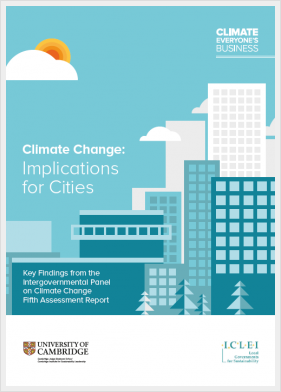
ICLEI survey: Only 25 percent of cities rely on business support for climate action
29 May 2014
by Richard Forster
A new briefing on climate change implications for cities, released during ICLEI’s Resilient Cities Conference, reveals that local resilience measures can accelerate successful climate adaptation globally.
“The IPCC’s [Intergovernmental Panel on Climate Change] analysis clearly shows that action in urban centres is essential to successful global climate change adaptation and mitigation, as these areas hold more than half the world’s population and most of its built assets and economic activities,” said Nikki Bartlett from the University of Cambridge Institute for Sustainability Leadership. “Decisions made at the city level can deliver real synergies, becoming more resilient to climate impacts while also seizing opportunities for lower-carbon living.”
The briefing, published jointly by ICLEI and the University of Cambridge’s Institute for Sustainability Leadership and Judge Business School, with the support of the European Climate Foundation, reveals that cities account for 37 to 49 percent of global greenhouse gas emissions with urban infrastructure accounting for over 70 percent of global energy use.
The key findings note that many emerging climate change risks are concentrated in urban areas, and that the greatest potential for mitigating greenhouse gas emissions may lie in rapidly developing cities in industrialising countries.
Against this backdrop an update of the Urban Climate Change Governance Survey revealed that 75 percent of the 350 ICLEI cities surveyed now include climate change planning and action as part of their overall planning.
“It’s the richest database that we currently have on what cities are doing in response to climate change,” Dr Alex Aylett, Professor from MIT, who conducted the survey in collaboration with ICLEI, told the audience. “We are seeing an integration of adaptation and mitigation, mainstreaming in sectoral and long range planning and in cities’ climate change action plans. Climate change is becoming a new urban DNA for cities.”
Further findings reveal, however, that only 25 percent received local business and industry support in creating and implementing their mitigation plans, with only a small number of cities incorporating their plans with economic development priorities.
“Actors from the economy and economic activity are excluded, both in the private sector and from within the municipal arms dedicated to business and job creation,” added Aylett. “This is a site of potential resources to bring in new ideas and new areas of actions.”
ICLEI, the association of local governments for sustainability, is hosting its 5th Resilient Cities Conference, in collaboration with the City of Bonn and the World Mayors Council on Climate Change. The conference concludes Saturday 31 May.











